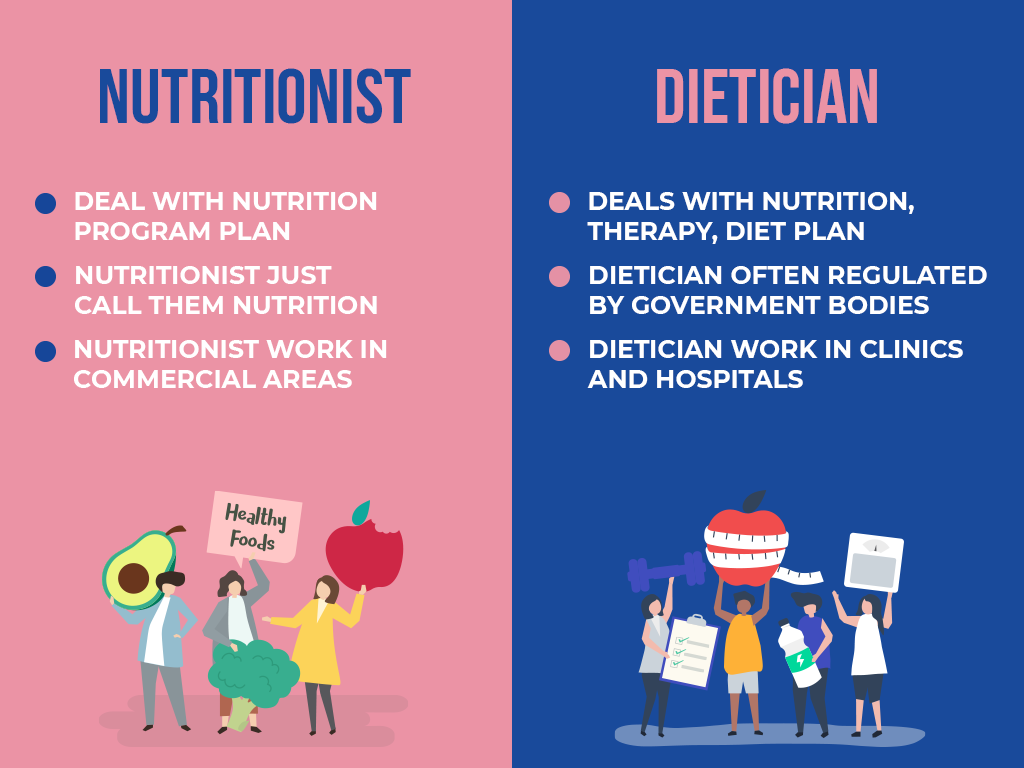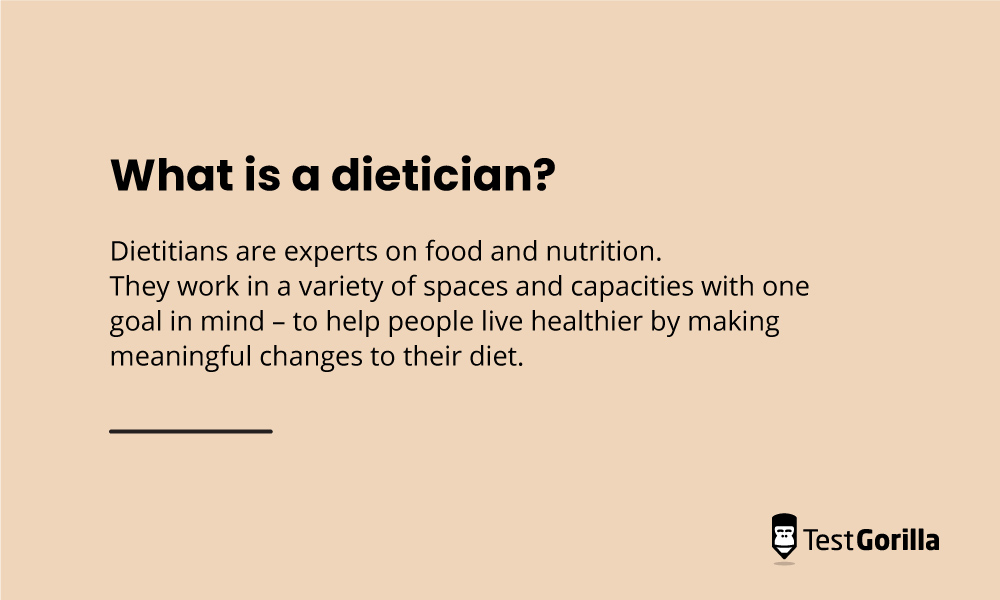All Categories
Featured
Table of Contents
-1
In the USA and numerous various other countries, a dietitian is a board-certified food and nourishment expert. They are highly educated in the area of nutrition and dietetics the scientific research of food, nourishment, and their impact on human health and wellness. Via extensive training, dietitians acquire the knowledge to give evidence-based clinical nutrition therapy and nutritional counseling customized to fulfill an individual's needs.
-1To make these credentials dietitians-to-be need to initially make a bachelor's level or comparable credit scores from an approved program at an university or university. Generally, this calls for an undergraduate scientific research level, consisting of training courses in biology, microbiology, natural and not natural chemistry, biochemistry and biology, makeup, and physiology, as well as more specific nutrition coursework.
Professional Nutritionist – Stirling
-1This enables them to analyze severe needs, prioritizing life-threatening problems. Inpatient and outpatient dietitians additionally supply nourishment education and learning to individuals with specialized demands, such as those recently out of surgical procedure, in cancer cells treatment, or diagnosed with chronic illnesses like diabetes mellitus or kidney disease. In the outpatient setting, they offer more extensive dietary counseling functioning in the direction of a nutrition-oriented goal.
-1Research study dietitians usually work in research health centers, companies, or universities. When dietitians have gained their qualifications and are functioning in the area, they can go on to specialize in a certain subcategory, such as pediatrics or sports dietetics.
-1They might in addition teach in an academic or research establishment or cover nutrition-related topics. Others may function as health and wellness and nutrition professionals in media or as speakers. Dietitians are qualified to handle nourishment treatment throughout a period of severe and persistent problems. The kind of conditions they treat depends most on the setup of their practice.
Nutritionist Specialising In Eating Disorders – Westminster
-1In lots of states, such as Alaska, Florida, Illinois, Maryland, Massachusetts, and Pennsylvania, RDs and CNSs are provided the exact same state certificate, usually called an Accredited Dietitian Nutritionist (LDN) certificate. In states that don't control using this term, anybody with a rate of interest in diet plan or nourishment may call themselves a nutritionist.
-1Nonetheless, since uncredentialed nutritional experts usually do not have the know-how and training for clinical nourishment therapy and nourishment counseling, following their advice could be thought about dangerous (). Prior to consulting a nutritionist, you might want to check whether your state regulates who might utilize this title. In the U.S. states that don't manage the term, no levels or credentials are needed to be a nutritional expert.

-1
In states that do mandate licensure, the CNS or RD credential may called for. Those with CNS qualifications are health professionals like registered nurses or medical professionals with advanced health degrees who have looked for out added coursework, completed supervised method hours, and passed an examination looked after by the Board for Accreditation of Nutrition Specialists.
-1While a few of these approaches might have robust scientific backing, others may not. Offering nutrition recommendations without the appropriate knowledge and training can be hazardous, particularly when counseling those with health conditions. Therefore, if you are taking into consideration getting in touch with a nutritional expert, you may want to ask if they are a CNS or have state licensure or certification, or an additional credential.
Registered Nutritionist – Westminster
-1A number of states especially control this term. Furthermore, nutritionists might seek an innovative CNS certification.
-1It can be challenging to aid people make genuine, long lasting changes in their lives. When you get an effective instance, the reward can be exceptionally gratifying. If it's an occupation alternative that you intend to pursue, there are 2 main occupation alternatives offered to you. Both dietitians and nutritional experts supply a series of nutrition-based solutions to clients.
-1They have to have completed some degree of education in their field. They are likewise needed to have finished up to a year of monitored work, working within a led program at a health care facility, providing company, or neighborhood body. Dietitians have much greater expectations positioned on their capabilities and level of professionalism and reliability.
-1This indicates that there is no body that manages their credentials and no especially stringent guidelines that nutritionists demand to follow in order to be able to exercise. Dietitians, on the various other hand, are signed up with nationally recognised bodies, such as the Dietitians Organization of Australia. They need to comply with the National Proficiency Requirements for Dietitians.
Women’s Health Nutritionist – Westminster

-1
However, you can practice as a nutritionist without the same level of certification as a dietitian. Nutritional expert training courses can differ in length and high quality, with some as short as 6 weeks and covering much less material than a dietetics program. Depending on your education company, you can acquire a considerable amount of understanding with researching a simple nourishment course; nevertheless it is essential to examine the course content prior to commencing.
-1This can include attending sector workshops or checking out sector publications. Nutritionists, on the other hand, usually gain their credentials in order to supplement various other qualifications and supply far better advice to their customers. Nutritional experts can gain employment in a broad array of areas, consisting of public health advice, suggestions for people, and functioning with personal organisations.
-1Nutritional experts can function with sporting organisations, health clubs, schools and advise media outlets on basic terms and proper use of terms. Usually, people will certainly seek the services of a nutritionist to assist them in obtaining right into shape. Dietitians can operate in many of the exact same roles as nutritional experts. With a greater degree of certification, they can quickly go into a duty that a nutritionist would hold, provided they are or else equivalent.
Accredited Sports Nutritionist (Westminster )
-1Dietitians often work with even more clinically sensitive customers. Because of the high degree of knowledge required to supply solutions to these individuals, only recognized dietitians are allowed to supply care.
-1In Australia there is a difference in between a dietitian and various other dietary health carriers consisting of nutritionists. All dietitians are nutritional experts, yet nutritionists without a dietetics credentials can not call themselves a dietitian. While there are similarities between a dietitian and nutritional expert there are differences in qualifications and law. The dietetic career is controlled and meets rigorous criteria as set out by the National Partnership of Self Regulating Health Professions (NASRHP).
-1Dietitians with the Accredited Practising Dietitian (APD) credential devote to recurring training and education throughout their careers. They stick to our standard procedure. Dietitians have the understanding and abilities found in the National Competency Requirements for Dietitians. As an occupation, nutritionists are not managed in Australia under NASRHP or certified under a single governing body.
Fitness Nutritionist ( Stirling 6061)
-1If you have a chronic health condition and a care strategy from your GP, you may be able to assert a Medicare rebate when you see an APD. Discover more about aid with costs when seeing a dietitian. The main function of individuals operating in the profession of dietetics is personified in this declaration: The career of dietetics contributes to the promo of health and wellness and the avoidance and therapy of ailment by optimizing the nutrition of populaces, communities and people.
Latest Posts
The Truth About Weighing Yourself
Eating Disorder Dietitians & Nutritionists Perth
Intuitive Eating – Greater Geraldton